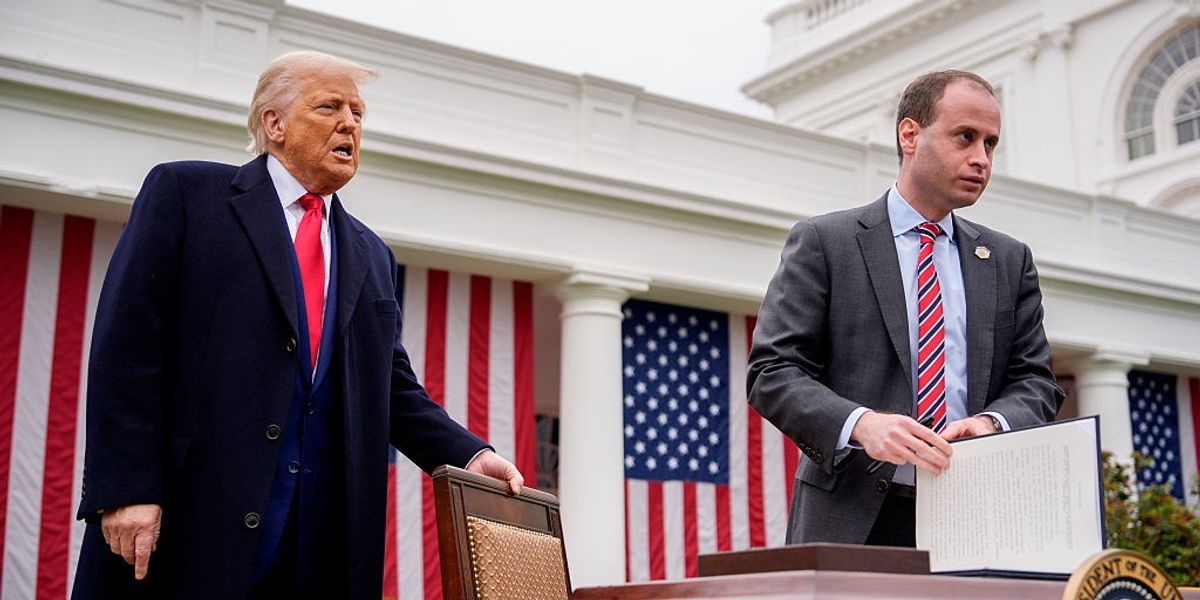
In An Era of Big Money, the University of Illinois Shrugs Off Rules on Athletes’ NIL Deals
April 4, 2025
New Projected Cost of Trump-GOP Tax Cuts for the Rich: ‘Staggering’ $7 Trillion | Common Dreams
April 4, 2025Third-generation farmer Igalious “Ike” Mills knew it was only a matter of time before a United States Department of Agriculture local office would close in his rural east Texas town.
He’d heard of the ongoing closures nationwide and kept close watch on the news about President Donald Trump’s calls for tariffs on nearly all U.S. trading partners.
The tariffs will be “bad” for farmers, and will result in increased production cost for imported materials such as “steel for barbed-wire fencing on our farms,” Mills said. The taxes will also cause higher consumer prices and food supply chain disruptions, he added.
As farmers navigate office closures, federal funding freezes, and job cuts, they endured yet another setback on Wednesday when Trump unveiled what he calls reciprocal tariffs on his self-proclaimed “Liberation Day.”
Americans are set to bear the burden of rising costs due to the tariffs, and Black farmers and rural households that are low income may be the hardest hit. The Trump administration is considering an emergency aid package for farmers, who are likely to be drastically affected by the ongoing trade war.
During Trump’s first term, farmers were hit hard by the retaliatory tariffs, losing more than $27 billion in agricultural exports, according to the USDA. The top commodities that experienced the largest losses were cotton, pork, soybeans, and sorghum. His administration created a subsidy program to offset the losses, which provided $12 billion in aid. However, more than 99% of the funds went to wealthy white farmers, specifically white men.
The tariffs — which are government taxes on imported goods — range from a minimum of 10% to 49%, according to a chart Trump held during a press conference on April 2. He also imposed a 25% tariff on all foreign automobiles. This is the “most aggressive tariff move yet by the most tariff-obsessed president in modern history.” Trump said this “declaration of economic independence” will help the U.S. reduce its taxes and pay down its national debt.
Harvey Reed III, an agricultural consultant and leader with the Beginning Farmers Coalition, said he strongly objects to the proposed tariffs as they will disproportionately hurt Black farmers and other vulnerable communities that rely on imported products.
“Many farmers I work with depend on affordable access to essential goods, and these tariffs will drive up costs, making it harder for them to sustain their operations,” Reed said. “This policy not only threatens the economic stability of these farmers but also exacerbates existing inequalities, leaving vulnerable communities to bear the brunt of increased prices and reduced access to necessary resources.”
Still, Mills puts things into perspective as he prepares for the challenges ahead. He said he and other farmers aren’t discouraged because they’ve been through worse things like “slavery, and it’s nothing like slavery.”
Although the tariffs will cause a strain, the closure of USDA offices will create additional barriers for Black farmers to receive adequate resources and information on federal programs. There’s already an existing information gap due to limited outreach by the agency and distrust with agency officials, farmers have previously shared.
In Mills’ hometown of Nacogdoches, the USDA’s Farm Service Agency closed its doors due to a lease termination, according to the Department of Government Efficiency’s website. The closures are the result of the DOGE, a non-government agency tasked with cutting government jobs and other spending.
The farm service agency is critical to providing information and resources related to disaster relief, conservation, and loans programs, especially for Black farmers who are still being locked out of USDA resources.
The uncertainty has left Black farmers without daily guidance on financing, regulations, and market opportunities for their operations, said Mills, who is the executive director of International Farmers and Ranchers organization. On behalf of local farmers, Mills contacted local agency officials and state directors, who expressed uncertainty about the next steps and which office they would direct farmers to. Mills is actively working to help farmers access what they need — with or without federal resources.
“A lot of them are coming from other smaller communities trying to get there [to Nacogodches]. It’s kind of got everybody in an unpredictable situation,” he said in a phone call. “People just don’t have answers. You can’t get any answers from the USDA themselves because from what it looks like, they’re going through a trial and error type situation.”
Nacogdoches, which has a population of 32,000, is one of hundreds of cities and towns across 40 states whose USDA offices are planning to close because of terminated leasing contracts, according to a Capital B analysis of DOGE lease data. The organization claims that $53.6 million from USDA agencies will be saved, which is 13% of the total savings from all lease terminations, according to a Capital B analysis.
A spokesperson for the USDA wrote in an email that Brooke Rollins, the secretary of agriculture, fully supports Trump’s directive to “eliminate wasteful spending.”
“USDA is optimizing building capacity and consolidating underutilized offices to reduce inefficiencies while continuing to prioritize frontline services for farmers, ranchers, and rural communities,” the statement said.
‘We’ve got to do something’
While the Trump administration touts extreme growth from the tariffs, farmers are struggling to access government resources from their county and state offices. According to the USDA, the agency consists of 29 agencies and more than 4,500 state offices. Together, the Farm Service Agency and Natural Resource Conservation Service have 2,300 offices nationwide.
Below is a list of USDA agencies forced to shut down or find a new lease:
- Agricultural Marketing Service
- Animal and Plant Health Inspection Service
- State and County Farm Service Agency
- Food and Nutrition Service
- Food Safety and Inspection Service
- Forest Service
- Natural Resources Conservation Service
- Rural Housing Service
- Foreign Agricultural Service

Reed questioned the need to eliminate offices when the USDA doesn’t have enough. On the other hand, some farmers distrust the officials in these offices and choose to avoid them entirely. Often, there is little to no proactive outreach to Black farmers.
“They’re not losing money on those offices, but the money being lost is [through] the people inside those offices, servicing those who come across that door. They should have looked at how we can better service our agriculture community, not by closing the office down,” Reed said.
He added: “Closing these offices down it’s like closing down schools. …It’s not the answer. We need more [Black] people in the industry because we’re aging out. Who’s going to take their place?”
Despite the challenges, Mills said the work must continue.
Back in Nacogdoches, he is gearing up for his organization’s first Agriculture and Forestry Summit in June. The convening is intended to connect farmers with agencies to learn more about their resources. At least one agency official who confirmed attendance has since backed out due to the directive of the agency to halt their work.
[We] hadn’t had anything like this to happen in the history of the country and that’s got everybody’s shell shocked, we can’t just not do nothing,” Mills said. “We got to do something. Everybody is just trying to maintain.”Great Job Aallyah Wright & the Team @ Capital B News Source link for sharing this story.





